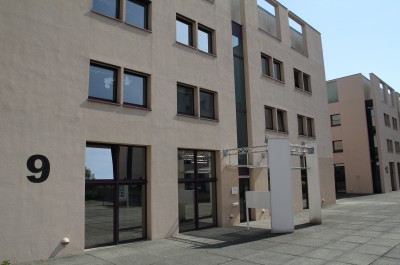risks, processes and strategies for prevention
| Project period |
15.02.2017 – 14.08.2020
The final theses are still ongoing
| Project staff |
Dr. Lena Lehmann (project manager)
| Funding |

Federal Ministry of Education and Research in the field of “Civilian Security – Aspects and Measures of Counter-Terrorism” within the program “Research for Civil Security 2012 – 2017”
| Cooperations |
Alliance partners:
- German Police University, Institute of Criminology and Interdisciplinary Crime Prevention (Prof. Dr. Thomas Görgen)
- Ernst-Moritz-Arndt-University of Greifswald, Department Health and Prevention (Prof. Dr. Silke Schmidt, Dr. Edzard Glitsch)
- Ernst-Moritz-Arndt-University of Greifswald, (Prof. Dr. Stefan Harrendorf)
- Friedrich-Schiller-University Jena, Institute of Psychology, Department of Research Synthesis, Intervention and Evaluation and Zentrum für Rechtsextremismusforschung, Demokratiebildung und gesellschaftliche Integration (Prof. Dr. Andreas Beelmann)
- Georg-August-University Göttingen, Institute of Criminal Law and Criminology (Prof. Dr. Katrin Höffler)
- Leibniz Universität Hannover, (Prof. Dr. Bernd-Dieter Meier)
- University of Cologne, Institute of Criminology (Prof. Dr. Frank Neubacher M.A., Dr. Nicole Bögelein)
Associated partners:
Federal Ministry of Justice and Consumer Protection
- Ministry of Home Affairs and Local North Rhine-Westphalia
- Ministry of the Interior and Sports Mecklenburg, Departments II 4 and II 5 (Police and Constitutional protection)
- National Criminal Police Office Mecklenburg
- Ministry of Education, Science and Culture Mecklenburg
- Ministry of Education, Science and Culture, Regional Center for Civic Education Mecklenburg
- German Congress on Crime Prevention
- Federal Ministry of the Interior – Task Force ÖS II 2 – International terrorism and extremism
- Lower Saxony Ministry of Interior and Sports
| Project description |
The objective of the joint project managed by KFN “Radicalization in the digital age – Risks, trends and strategies of prevention (RadigZ)” is to develop different prevention approaches and recommendations for action that relate to development-related radicalization processes and take special account of the threat potentials of the Internet as the central propagating medium of extremist ideologies. In addition to an in-depth analysis of the effects of internet-based propaganda as well as the identification of vulnerable groups and persons, the development of target-group-specific protection measures is the central concern of the project. This is to be achieved, in particular, by a critical analysis of existing preventive efforts as well as by prevention measures which are oriented towards radicalization processes and newly developed. The project addresses different extremist ideologies.
The main focus of KFN’s work is a broad-based quantitative youth study entitled “Youth Perspectives on Politics, Religion and Community (JuPe)”. This is a quantitative multi-theme survey of 9th grade students at various locations in Germany. The aim of the study is to find out what teenagers in today ‘s – digital – time moves. It is about capturing their views on society as well as their experiences, worries and moods. The focus is on questions of politics, religion and the community as well as possible reasons for turning to political, philosophical or religious extreme positions. In line with this survey, RadigZ is also conducting an online survey of students with a similar orientation.
In addition, KFN participates in the work centers of other partners. Within the framework of the partial project for the biographical and network analysis of (de) radicalization processes, KFN is interested in the lives and experiences of strictly religious Muslims in Germany, whereby the use of digital media within this group is also of interest. For this purpose, narrative interviews will be carried out and analyzed using reconstructive methods.
KFN’s participation in the subprojects of GKS and DHPol which focuses on the analysis of Internet-based propaganda and / or calls to extremist violence and criminal offenses over the Internet is also worth mentioning. The analysis of the extremist online material addressed by the project partners is deepened and completed by KFN, focusing on the visual productions in particular. Reconstructive methods are used to investigate which latent messages are mediated by means of images, videos and texts, especially in their combination, in extremist online events, and how group memberships are produced in a communicative manner in these media.
Finally, the KFN, in addition to the subproject of the LUH, conducts interviews with experts in the field of prevention, which refers to left-wing extremism. The aim is to elaborate both deficits and successful measures and strategies of existing approaches in the area of left-wing extremism prevention.
Further information can be found at radigz.de/en.
English Summary of the Report No. 151
English Summary of the Report No. 156
Recommended actions to policy, practice and society [PDF in german]

